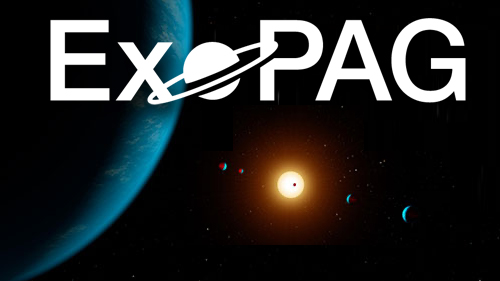Much of the ExoPAG's work is conducted by Study Analysis Groups (SAGs) and Science Interest Groups (SIGs), which focus on specific exoplanet topics or goals. The exoplanet community is encouraged to participate in the ExoPAG and in SAGs or SIGs of interest.
Contents:
SIG #2: Exoplanet Demographics
SIG 2 Membership List
To join, please contact the co-chairs, Samson Johnson (samson.a.johnson@jpl.nasa.gov) and Rachel Fernandes (rachelbf@lpl.arizona.edu).
The study of exoplanet demographics holds the answers to some of the next big questions in the exoplanet field. The long-term goal of this science interest group is to carefully synthesize exoplanet system demographics across a variety of detection surveys and techniques, in order to extend the focused results of ExoPAG SAG 13 to a broader range of exoplanets, host stars and environments. These results will then be used to inform theoretical models of exoplanet formation and evolution, and in predictions of yields from future exoplanet missions.
The SIG is open to all members of the community, especially those in the field of (and those adjacent to) exoplanet demographics.
Enabling Exoplanet Demographics Studies with Standardized Exoplanet Survey Meta-Data (Draft - 1/10/2022). Prepared by the ExoPAG Science Interest Group (SIG) #2 for community comment.
Exoplanet Demographics: Piecing Together the Complete Puzzle of Planet Populations (Virtual Online Meeting; November 9-13, 2020)
SIG #3: Exoplanet / Solar System Synergies
To join, please contact the co-chairs Vikki Meadows (vsm@astro.washington.edu) and Kathy Mandt (Kathleen.Mandt@jhuapl.edu).
The goal of this Science Interest Group is to coordinate joint activities and an ongoing discussion on how Exoplanet and Solar System science and missions can benefit from each other. This SIG will endeavor to identify multiple initiatives that could be mutually beneficial for both communities and will encourage cross-disciplinary interaction between ExoPAGs and the Planetary Advisory Groups.
+ more
As exoplanet characterization capabilities improve, the exoplanet community is moving towards a systems- and process-based approach to understanding planetary formation, evolution, habitability and biosignatures. This effort requires observations, theory and laboratory research from multiple disciplines drawing on knowledge and techniques developed from detailed studies of Solar System planets, including Earth. Additionally, exoplanets provide a much broader cosmic context for our Solar System planets and architecture because the sheer number of exoplanets has revealed a hitherto unexpected diversity of worlds, some of which are not present in our Solar System, and provided statistics that help illuminate a broader range of planetary processes and evolution, including star-planet interactions. At the recent Exoplanets in Our Backyard interdisciplinary workshop, members of both the exoplanet and Solar System communities identified the enhancement of cross-disciplinary communication and activities as critical to advancing both fields.
The goal of this Science Interest Group is to coordinate joint activities and an ongoing discussion on how Exoplanet and Solar System science and missions can benefit from each other. This SIG will endeavor to identify multiple initiatives that could be mutually beneficial for both communities and will encourage cross-disciplinary interaction between ExoPAGs and the Planetary AGs. We will provide a forum that will initially catalyze interaction between the Solar System and exoplanet communities on topics of mutual interest, and to work to identify ways in which NASA could enhance these interactions. In subsequent efforts, we will work to enhance interactions with heliophysicists and Earth scientists. Some ideas for initial activities include coordination of monthly webinars with Solar System/exoplanet presenters, discussion fora, development of workshop proposals, cross-PAG/AG activities and presentations, and joint review papers or SIG reports that highlight particularly beneficial avenues for future joint research between the exoplanet and Solar System communities. This SIG is open to all members of the exoplanet, solar system, Earth science, and heliophysics communities who are interested in cross-division efforts to advance exoplanet and solar system science.
Completed SIGs
SIG #1: Toward a Near-Term Exoplanet Community Plan
+ more
This Science Interest Group is now complete. The goal of this SIG was to begin the process of developing a holistic, broad, unified, and coherent plan for exoplanet exploration, focusing on areas where NASA can contribute. To accomplish this goal, the SIG worked with the ExoPAG to collect community input on the objectives and priorities for the study of exoplanets. Using this input, it attempted to develop a near-term (5-10 year) plan for exoplanets, based on the broadest possible community consensus. The results of this effort will serve as input to more formal strategic planning activities that we expect will be initiated near the end of the decade in advance of the next decadal survey.
Final Report: B. Scott Gaudi et al. (2015) "Exoplanet Exploration Program Analysis Group (ExoPAG) Report to Paul Hertz Regarding Large Mission Concepts to Study for the 2020 Decadal Survey"

